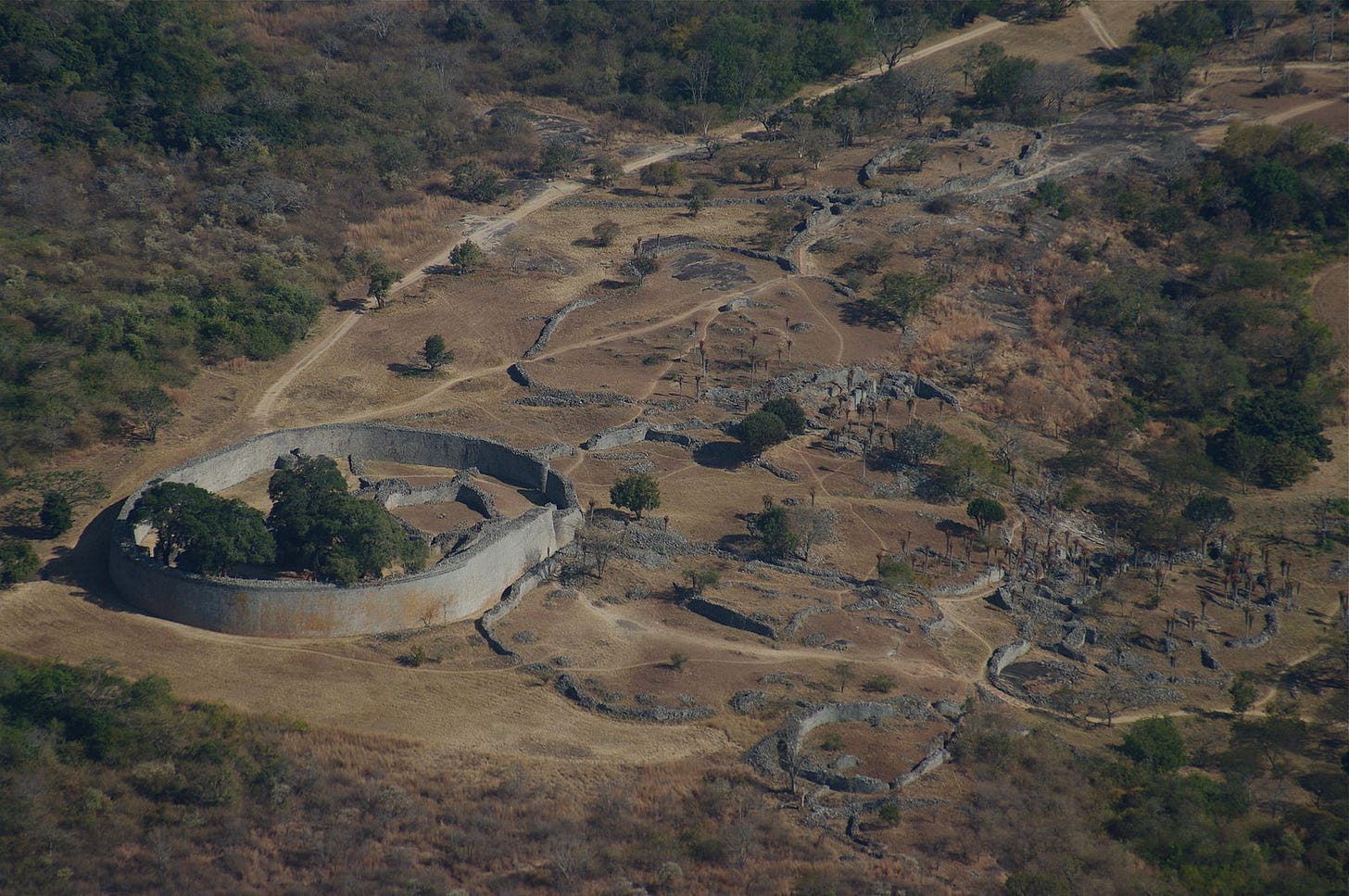The incredible ancient city no one could believe was built by Africans
Great Zimbabwe and the ruins that confounded historians and archaeologists
Civilisations
If anyone asked me to name an ancient civilisation, I would mention one of two; the lost city of Atlantis or Ancient Egypt. Of course, there is the Greek and Roman civilisations which are well documented and whose influence is all over western culture and society. Regardless most civilisations would be based on what I learned in school or in popular culture and most of that was and is eurocentric.
However, during my journey for a deeper understanding of my heritage I begun to discover African civilisations I never knew existed. Civilisations that aren't myth but have present-day physical evidence of that existence. One such civilisation is known as Great Zimbabwe, a place I didn't know about till a few weeks ago when researching topics for the Alkebulan newsletter.
When I say I didn't know about this place, I'd never even heard the name. When you read what I'm about to tell you, that fact is even more crazy especially if you're African as I am.
If you find this newsletter valuable, consider becoming a paid subscriber to support my work or you can gain premium access through inviting your friends and family to sign up. Your support and promotion of the work we’re doing here is appreciated.
The Beginning
Long before the age of European exploration, Africa was home to this grand city so magnificent, its very existence still confounds historians and archaeologists today. In the early 16th century, rumours spread around Europe of this mysterious fortress with gargantuan walls, surrounded by gold mines and sitting on a 900-meter-high hill. It was believed to represent the summit of a unique African civilization which had traded with distant Asian countries including China and Persia.
Spread over almost 800 hectares of land in modern-day Zimbabwe, this city, which once thrived between the 11th and 15th centuries, remains shrouded in mystery. And while many would like you to believe that Africa's history is just about tribes and primitive practices, the remains of Great Zimbabwe offer a sharp rebuttal, revealing Africa's significant legacy of urban civilization, sophisticated kingdoms, and unparalleled craftsmanship.
The History
Africa has a rich history regardless of the fact much of it has yet to be brought to light. However, sophistication in that history isn’t an aspect often highlighted in mainstream discourse on ancient civilisations. The idea that Africans could have been architects of genuine complexity was tough to accept for many. The stone ruins of Great Zimbabwe stand as testimony that such a belief is erroneous.
With walls as high as 36 feet and extending over 820 feet, they are the largest ancient stone construction south of the Sahara. Interestingly, no mortar was used to build them. That's insane. The precision with which these stones were laid out reveals an architectural prowess that was far ahead of its time. But what was the purpose of these structures?
While the West has often spun tales of exotic treasures and Ophir's fabled city, the locals and scholars provide a more grounded story. These were likely royal palaces, with the Hill Complex serving as the chief's residence and the Valley Complex housing the commoners.
Trade and Economy
Now, if you're wondering how a city of such stature sustained itself, the answer is trade. Archaeological findings indicate that Great Zimbabwe was a major trading hub. Excavations have unearthed Chinese pottery, Persian ceramics, and Arabian coins, indicating a vast and sophisticated trade network. At its peak, an estimated 18,000 people lived in the capital of the Kingdom of Zimbabwe, with only a fraction residing within its massive stone buildings.
Yet, many still question: could Africans have built and managed such a complex? This condescending narrative has often attributed the city's grandeur to external forces like the Phoenicians or even aliens!
This is something that is incredibly transparent in its prejudice. Why is it whenever something incredible exists in black Africa the at some stage folks come up with the idea that aliens must have built them? This is the same thing that’s often been considered when asking who built the pyramids in Egypt and Sudan.
German explorer Karl Mauch, who visited in 1871, refused to believe that indigenous Africans could have built such an extensive network of monuments. He even suggested that the ruins were a replica of Solomon's temple and the palace of the Queen of Sheba. Such views were not isolated. Other European writers also doubted the African origins, suggesting it could have been built by Portuguese travelers, Arabs, Chinese, or Persians. However, artifacts, local oral traditions, and architectural similarities with other regional sites dismantle these skewed perceptions. Non of these groups built Great Zimbabwe nor did Aliens. It was undoubtedly African in origin and execution.
Spirituality
As with most things of African origin, there’s a spiritual essence of Great Zimbabwe. The iconic Zimbabwe Birds, eight soapstone carvings found in the ruins, give us a glimpse into the spiritual realm of this civilization. Representing a bird atop a human or a crocodile, these artifacts are believed to be symbols of the royalty's spiritual guardians.
Exploitation and Narratives
The history of Great Zimbabwe is marred by misinterpretations and deliberate distortions. European colonialists, upon discovering the ruins, were often blinded by their prejudices, finding it hard to believe that such an architectural marvel could be the work of Africans.
In the late 19th century, British colonizer Cecil Rhodes sponsored an expedition led by archaeologist James Theodore Bent. Bent's mission was clear: to validate the theory that Great Zimbabwe wasn't the work of native Africans.
The colonial leadership of Rhodesia, particularly under Ian Smith, perpetuated these misconceptions. Official guidebooks during Smith's tenure depicted a narrative where Africans were subservient, suggesting they bowed to foreign builders of Great Zimbabwe, rather than being its true architects. In addition to this, the ruins have been damaged over the last two centuries. Richard Nicklin Hall, tasked by the British South Africa Company in the early 20th century to preserve Great Zimbabwe, ironically caused significant damage. He justified his actions as a cleansing of African "residue and decay," removing vast archaeological layers in the process.
He was actually trying to remove any and every trace of blackness from the ruins as a form of cleansing and didn't attempt to hide it.
Subsequent reconstruction efforts after 1980, driven by a sense of national pride, unfortunately led to more damage. The allure of the ruins also attracts thousands of tourists annually, some of whom, in their enthusiasm, inadvertently harm the site by climbing walls and taking souvenirs. From my reading it just doesn’t seem they wanted to preserve the place with any level of integrity or care most likely because it didn’t tell the story they wanted it to tell of Africa.
In 1980, Robert Mugabe's rise to power marked a significant shift. The nation embraced its rich heritage, renaming itself "Zimbabwe" after the ancient city. The iconic soapstone bird carvings of Great Zimbabwe found a place of pride on the nation's flag, signifying a renewed connection to a glorious past. This should give you some context on the often negative connotations given of him. I don’t ever remember a send up or satire of Cecil Rhodes in the UK media but I do countless lampoons of Mugabe as a tyrant dictator. Heroes are most definitely subjective.
Great Zimbabwe isn't just a historical relic; it's a lesson. A lesson that Africa, often overlooked in tales of ancient grandeur, has a legacy as rich and profound as any continent. While the world was building its civilizations, Africa wasn't merely watching; it was setting standards.
The lens of prejudice can distort truths to incredible degrees. For centuries, the narrative of Great Zimbabwe was manipulated, but as the saying goes; the truth will always fight to be free. I now know of this magnificent city, and for those like me who’d never heard of this African city, it’s a great discovery.










I'm glad you talked about Great Zimbabwe 🇿🇼 . It's been a history monument to the country for years and I take pride for that.
I cant wait to visit this one day! I'm sure there is also more to the underground cave networks of Harare as well!